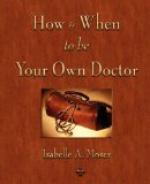Exercise also changes the metabolic rate so your body burns more calories—not only while you are exercising, but also for a 24 hour period following exercise. This maintains a healthful body weight into old age, or helps to lose weight. Most people find that exercise in moderation does not increase appetite, so that it is possible to consistently burn more calories in a day, and gradually reduce weight if that is desirable. It is necessary to burn 3,500 calories to lose a pound of weight. Most forms of exercise allow you to burn 300 to 600 calories per hour at a moderate pace which would be achieved by doubling the resting pulse. Without even considering the weight-loss benefit of achieving a raised metabolism, an hour of daily exercise continued for a week or two dependent upon the type of exercise and pace should lead to one pound of weight loss if the caloric intake is held constant.
The flip side of having a higher metabolism is rarely appreciated but is extremely important. Recall the basic equation of health: Health = Nutrition / Calories. Exercise permits a person to eat somewhat more while not gaining weight. If the food is nutrient rich, the body has a chance to extract more vitamins, more minerals, more amino acids. The person who remains slender by rigidly reducing their food intake to near starvation levels may lack vital, health-building nutrition.
And only exercise moves lymphatic fluid. The blood is pumped through the body by the heart, but the lymphatic system, lacking a heart, requires muscular contractions to move from the extremities of the body to the central cavity. The lymphatic system picks up cellular waste products and conducts these toxins to disposal. Frequently, people with rheumatic aches and pains or other generalized muscular discomforts physicians like to give Latin diagnostic names to can give up taking pain pills if they will but begin exercising regularly. Only when they begin moving their lymph can they begin to detoxify properly.
There is another benefit from exercise which is not to be ignored, and that is that it gives the person a chemical sense of well being. It actually will help to emotionally boost up people who are chronically depressed and make them smile. After a good workout, especially one done outside, everything seems brighter, more positive; whatever was bothering you somehow just doesn’t seem like that big of a deal now. I am not making pro-exercise propaganda. This is not a figment of the imagination. An exercising body really does make antidepressant neurochemicals called endorphins, but only after about 45 minutes to an hour of aerobic workout.
Endorphins are powerful, with painkilling and euphoric effects equal to or greater than heroin, but without any undesirable side effects. If chemists could learn to cheaply synthesize endorphins I’m sure that millions of people would want to become addicted to them. Because I make such a point of getting in my workout every day, my husband has accused me of being an endorphin junkie, and he is right! I admit it, I’m really hooked on the feeling of well being I consistently get from any sustained exercise. I defend my addiction staunchly because it is the healthiest addiction I know of.




